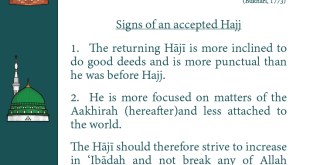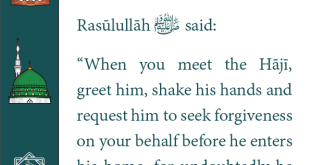Visiting the Rawdha Mubaarak is such an important and meritorious act. It deserves utmost respect and etiquette. There are many etiquettes of visiting the Rawdha Mubaarak, the details of which are not within the scope of this article. However, a few shall be listed below:
- In principle, we should understand that during the entire journey to Madinah Munawwarah and visiting the Rawdha Mubaarak, the main element is love. If one has true love for Rasulullah Sallallahu ‘Alayhi Wa Sallam, then no one needs to instruct him how he should conduct himself in the esteemed presence of Rasulullah Sallallahu ‘Alayhi Wa Sallam. All these etiquettes would be displayed instinctively by him.
- The intention for visiting Madinah Munawwarah should be purely to visit Rasulullah Sallallahu Alayhi Wa Sallam.
- One should not feel that he is visiting a dead person, rather it is the belief of the Ahlus Sunnah wal Jamaa’ah that Rasulullah Sallallahu ‘Alayhi Wa Sallam is alive in his grave.
- Upon reaching Madinah Munawwarah, one should settle down as quickly as possible (without rushing), take a bath, wear one’s best clothes and apply ‘Itr (as one does on the days of Jumu’ah and ‘Eid).
- Proceed to Masjid Nabawi keeping in mind the sacredness of the land upon which one is walking. Be absolutely grateful to Allah Ta’aala for blessing one with this great opportunity despite not being worthy of it.
- It is preferable to give some Sadaqah before presenting oneself at the Rawdha Mubaarak.
- Enter the Masjid fulfilling all the etiquettes.
- Read two Rakaats Tahiyyatul Masjid, preferably in Riyaadhul Jannah (the portion between the Mimbar and the resting place of Rasulullah Sallallahu ‘Alayhi Wa Sallam) if possible, otherwise in any other place in the Masjid.
- Engage in Du’aa, by firstly thanking Allah Ta’aala for affording one this great opportunity and secondly begging Him for His forgiveness. Thereafter, one should implore Allah Ta’aala to cleanse one’s heart and make one befitting of appearing before the august presence of Rasulullah Sallallahu ‘Alayhi Wa Sallam.
- Proceed to the Rawdha Mubaarak with utmost respect, the heart brimming with the love of Rasulullah Sallallahu ‘Alayhi Wa Sallam and with the tongue constantly engaged in Durood.
- Present oneself before Rasulullah Sallallahu ‘Alayhi Wa Sallam and offer one’s Salaam to him imagining him replying to the Salaam and with full conviction that he does reply to the Salaam.
- Instead of reading the Salaam from a card or book in parrot-fashion, one should rather offer short forms of Salaam with full concentration, e.g. “As Salaatu was Salaamu ‘Alayka ya Rasulallah” or “As Salaamu ‘Alayka Ayyuhan Nabiyyu wa Rahmatullahi wa Barakaatuh”.
- Convey the Salaams of others in this manner, “As Salaatu was Salaamu ‘Alayka ya Rasulallah min (the person’s name)”.
- Request Rasulullah Sallallahu ‘Alayhi Wa Sallam for his intercession on the Day of Qiyaamah.
- Engage in Du’aa to Allah Ta’aala for all one’s needs. There is great hope of this Du’aa being accepted.
- Remain standing in front of the Rawdha Mubaarak for as long as one remains focused.
- Move slightly to the right and offer Salaam to Hazrat Abu Bakr Radiyallahu ‘Anhu in these words, “As Salaamu ‘Alayka ya Aba Bakr”, and move further to the right and offer Salaam to Hazrat ‘Umar Radiyallahu Anhu saying, “As Salaamu ‘Alayka ya ‘Umar”.
If one follows these few guidelines, with concentration and the correct frame of mind, it will be a means of one receiving tremendous benefits from this visit to the Rawdha Mubaarak, In Sha Allah.
May Allah Ta’aala bless us with the opportunity of presenting our impure souls and bodies in the esteemed court of Rasulullah Sallallahu ‘Alayhi Wa Sallam over and over again with true love and respect, and then returning from there purified and forgiven, Aameen.
 Wifāq ul Ulāma (SA) ASSOCIATION OF SOUTH AFRICAN 'ULAMA
Wifāq ul Ulāma (SA) ASSOCIATION OF SOUTH AFRICAN 'ULAMA


